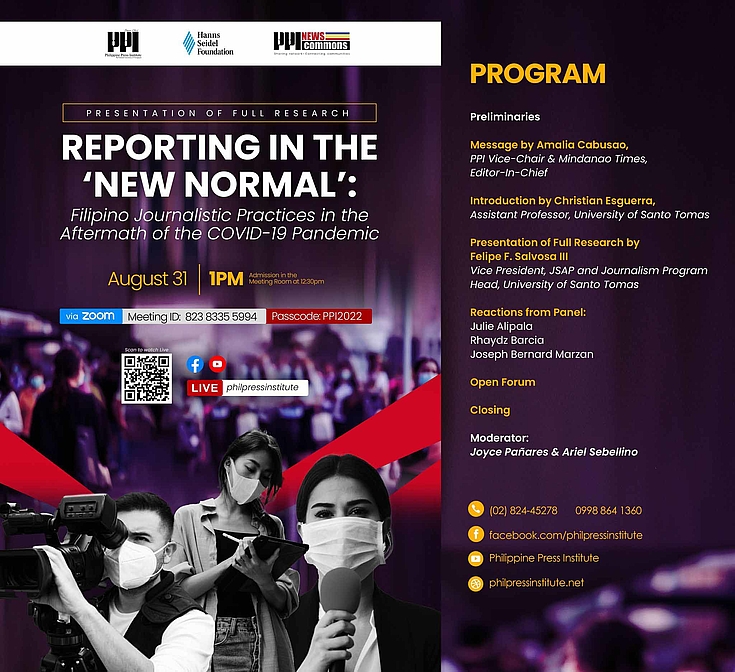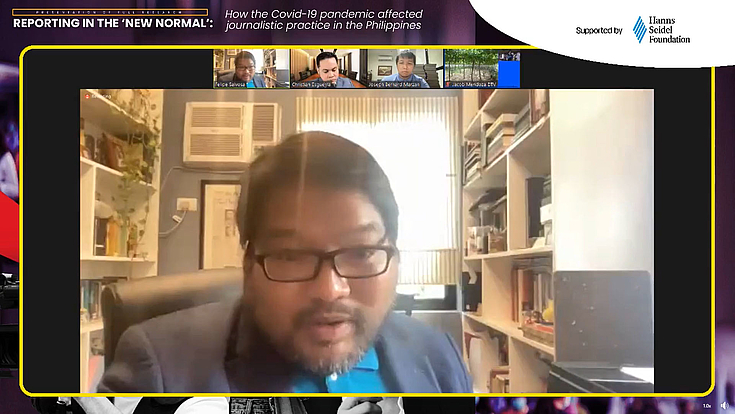Study on Media and the Pandemic
Academe Explores the Health Situation’s Influence on Journalists’ Reporting
PPI
The pandemic has been affecting the lives of people all over the world for more than two years now, including those of media persons, who are amongst the frontliners. University of Santo Tomas (UST) faculty members began the second track of a study on the impact of the pandemic on the reporting of Filipino journalists in March 2022. The results of the research are intended to promote a better understanding of the occupational challenges of media persons who have to weather the pandemic regardless, while working to overcome personal challenges it brought about and to initiate discourse on possible ways to address concerns, which may be identified.
“How did the Covid-19 pandemic affect news-gathering practices and the editorial approaches of Filipino journalists?” This was the main research question of the study, which provided more in-depth experiences of journalists and insights into journalistic conditions and practices during the pandemic. The results of this qualitative phase of the research project, of which thematic analysis was part of the methodology used, revealed main findings on the journalists’ views as regards “key issues confronting the Philippines during the Covid-19 crisis,” “reporting methods during the pandemic,” “personal and professional challenges they encountered” and “role perception of journalists” or their view of their role as journalists.
This research project is a continuation of the study entitled “Reporting in the ‘New Normal’: Filipino Journalistic Practices in the aftermath of the Covid-19 Pandemic.” It is a collaboration between two faculty members of the Journalism Program of the Faculty of Arts and Letters and the Graduate School of the UST, both of whom are affiliated with the University’s Research Center for Culture, Arts and the Humanities. The research project aimed to find out “how quarantine regulations have, given the pandemic situation, altered the news-gathering practices and the editorial approaches of Filipino journalists and their news organisations.”
PPI
In this qualitative phase of the project, in-depth interviews were conducted with thirty journalists who reported on the pandemic in different news platforms. Eleven community journalists are from local or regional news outfits and nineteen, from national news organisations. The majority of the interviewees -- sixteen in total -- were reporting through print/online platforms. The remainder comprised those on purely online platforms, those reporting on television/radio, for a wire agency or for a non-profit entity plus a freelancer.
The results of the research revealed that the interviewees identified “unpreparedness,” “misinformation and disinformation,” including the impact these wrought, and “corruption” as the three key issues confronting the Philippines during the global Covid-19 situation. The results also showed the journalists’ creativity, commitment to truth-telling, and resolve as they resorted to adapting reporting methods to the fluid environment, came up with alternative ways of gathering data and information, expanded verification channels, established virtual lines of communication and exerted particular efforts in evaluating source credibility.
Meanwhile, physical and mental health struggles turned out to be a reality they have had to live with. The responses of the interviewees also showed that, challenges notwithstanding, the journalists remained steadfast in their commitment to their trade and their role as journalists as providers of accurate information and of necessary context in news to promote better public understanding.
This online presentation was organised by the PPI with support from the Hanns Seidel Foundation (HSF) as part of their project cooperation on, "Civic Journalism." Streamed live, it had 230 logged-in participants, amongst them, students, educators, representatives from local government line agencies and media persons. This study, the first track of which commenced in June 2021, was undertaken as part of the Global Risk Journalism Hub, a global journalism research network. The results are intended to feed into the programme content of the PPI’s Scholastic Outreach Seminar Series planned for 2023.
Within the framework of the Global Risk Journalism Hub research initiative, the results are planned to be compiled along with those of the studies conducted in other countries in South/Southeast Asia and publications thereof are said to be foreseen. This research project is the second one that the HSF has supported with the PPI. The first one, “Democracy Resilience and Media Literacy amid the Pandemic: Perspectives of Civic Journalists,” was conducted by the Polytechnic University in 2021 and the results and their analyses were discussed extensively in the PPI’s Scholastic Outreach Seminar Series held in the same year.
Download Research Paper


